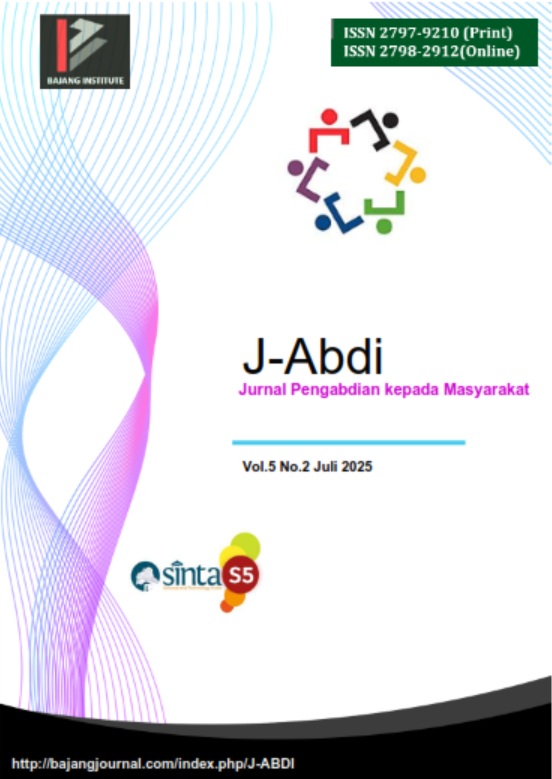SOSIALISASI PENGARUH TERAPI PSIKORELIGIUS DZIKIR UNTUK MENURUNKAN SALAH SATU TANDA DAN GEJALA DARI SKIZOFRENIA YAITU HALUSINASI PENDENGARAN DIWILAYAH KERJA UPTD PUSKESMAS KONCARA KABUPATEN PURWAKARTA
Keywords:
Schizophrenia, Auditory Hallucinations, Psychoreligious Therapy, DhikrAbstract
Auditory hallucinations are one of the main symptoms in schizophrenia patients which often cause emotional distress and maladaptive behavior. Psychoreligious approaches such as dhikr therapy are believed to help reduce the intensity of hallucinations by increasing mental peace and spiritual strengthening of patients. To determine the effect of implementing dhikr psychoreligious therapy on reducing the intensity of auditory hallucinations in schizophrenia patients in the working area of the Koncara Community Health Center UPTD, Purwakarta Regency. This community service activity aims to improve the knowledge and skills of nurses at the Koncara Community Health Center in carrying out dhikr psychoreligious therapy to reduce the signs and symptoms of schizophrenia in the Koncara Community Health Center UPTD. The method of implementing the activity uses a lecture, demonstration, and simulation approach. The activity participants were 20 people consisting of implementing nurses and shift managers. Evaluation was carried out using a pre-test and post-test to assess the increase in knowledge, as well as observation of skills during the simulation practice. The results of the activity showed an increase in participants' knowledge from an average value of 58% (pre-test) to 89% (post-test). Furthermore, 90% of participants were able to perform the psychoreligious therapy simulation using the correct techniques. Participants also demonstrated high enthusiasm throughout the entire series of activities. Psychoreligious therapy outreach and training have proven effective in improving the knowledge and skills of nurses at the Koncara Community Service Unit (UPTD PKM). This therapy can be used as a non-pharmacological intervention to support the healing process of patients with mental disorders.
References
Aini, R., & Sulastri, D. (2020). Efektivitas terapi dzikir terhadap penurunan tingkat halusinasi pada pasien skizofrenia. Jurnal Keperawatan Jiwa, 8(2), 101–109.
American Psychiatric Association. (2022). Diagnostic and Statistical Manual of Mental Disorders (5th ed., text rev.; DSM-5-TR). Washington, DC: American Psychiatric Publishing.
Azizah, L. M., & Rahayu, S. (2021). Asuhan Keperawatan Jiwa: Konsep dan Penerapan Praktik. Yogyakarta: Deepublish.
Bastaman, H. D. (2019). Integrasi Psikologi dan Islam: Menuju Psikologi Islami. Jakarta: RajaGrafindo Persada.
Damanik, R., & Sitanggang, F. (2022). Pengaruh terapi religius terhadap penurunan tingkat kecemasan pada pasien gangguan jiwa di RS Jiwa Prof. Dr. M. Ildrem Medan. Jurnal Kesehatan Masyarakat, 10(1), 45–54.
Depkes RI. (2020). Pedoman Nasional Pengendalian Gangguan Jiwa. Jakarta: Kementerian Kesehatan Republik Indonesia.
Hawari, D. (2018). Ilmu Kedokteran Jiwa dan Kesehatan Jiwa Islami. Jakarta: Fakultas Kedokteran Universitas Indonesia.
Herawati, R., & Suryani, E. (2021). Efektivitas terapi religius dzikir terhadap intensitas halusinasi pada pasien skizofrenia. Jurnal Keperawatan Profesional, 9(1), 55–62.
Maramis, W. F., & Maramis, A. A. (2020). Catatan Ilmu Kedokteran Jiwa (Edisi 3). Surabaya: Airlangga University Press.
Nurbaiti, N. (2019). Pengaruh terapi dzikir terhadap tingkat stres pada pasien gangguan jiwa di Rumah Sakit Jiwa Provinsi Aceh. Jurnal Psikologi Islami, 6(2), 77–85.
Nurhidayah, S., & Fitriana, E. (2020). Konsep dan Aplikasi Terapi Keperawatan Jiwa. Bandung: Refika Aditama.
Rahmawati, I. (2021). Pengaruh terapi dzikir terhadap intensitas halusinasi pendengaran pada pasien skizofrenia di RSJ Dr. Radjiman Wediodiningrat Lawang. Jurnal Ilmiah Kesehatan, 14(3), 200–210.
Stuart, G. W. (2019). Principles and Practice of Psychiatric Nursing (11th ed.). St. Louis: Elsevier.
Videbeck, S. L. (2020). Psychiatric-Mental Health Nursing (8th ed.). Philadelphia: Wolters Kluwer.
WHO. (2023). World Mental Health Report: Transforming Mental Health for All. Geneva: World Health OrganizationRendah. Jurnal Psikososial dan Keperawatan Mental, 8(1), 35–42.
Kementerian Kesehatan RI. (2019). Standar Diagnosis Keperawatan Indonesia (SDKI). Jakarta: Direktorat Keperawatan.
NANDA International. (2021). NANDA-I Nursing Diagnoses: Definitions and Classification 2021–2023. Thieme Medical Publishers.














